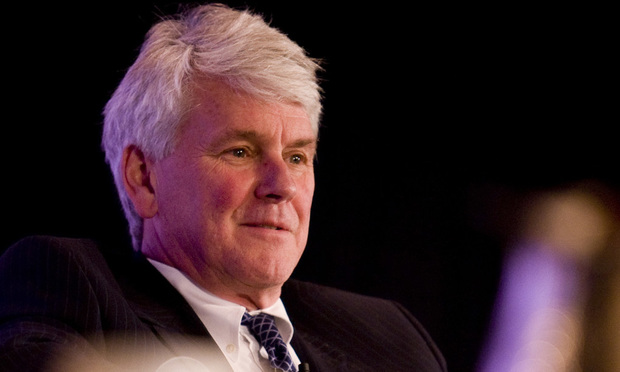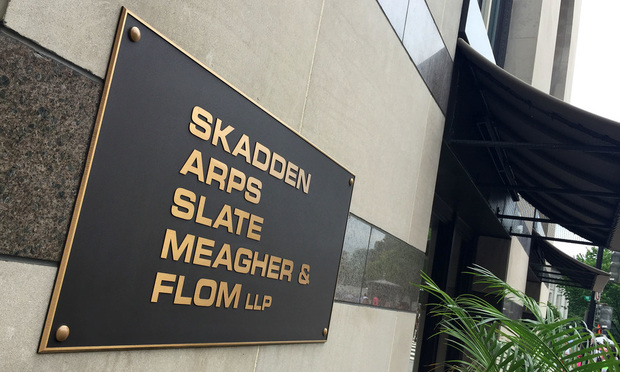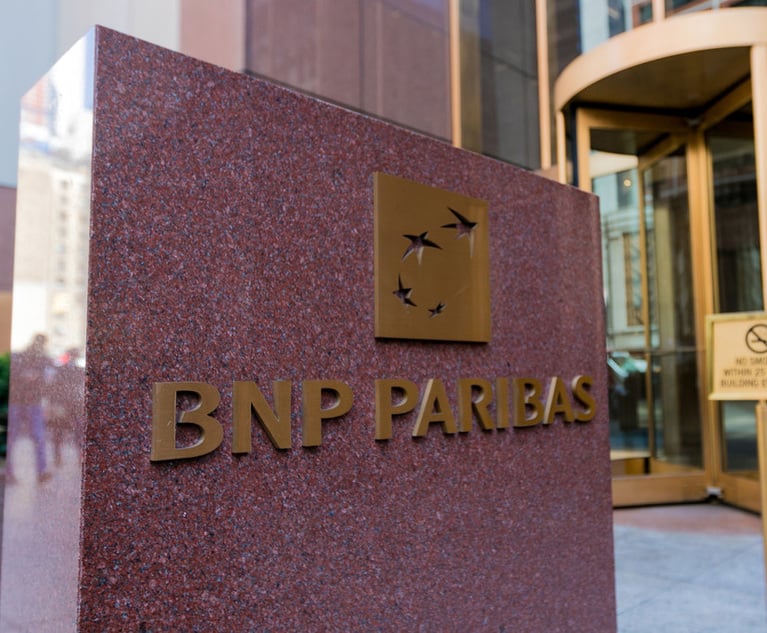Skadden's Greg Craig Is Warned To Keep a Distance From Former Colleagues
An encounter underscored an awkward dynamic of Greg Craig’s case in Washington's federal trial court: Friends and former colleagues are being called to testify against him.
August 19, 2019 at 09:08 AM
6 minute read
The original version of this story was published on National Law Journal
 Gregory Craig. Photo: Diego M. Radzinschi/ NLJ
Gregory Craig. Photo: Diego M. Radzinschi/ NLJ
Early Thursday evening, as he left the federal court in Washington, Greg Craig ran into a former colleague who used to work with him at the law firm Skadden, Arps, Slate, Meagher & Flom.
Shaking the hand of Skadden partner Michael Loucks, Craig said, “I know I’m not supposed to do this, but I just wanted to say hello.”
Loucks was not just any past colleague. That afternoon, he’d been called as the first witness as prosecutors began making their case against Craig, who is charged with misleading the Justice Department about his work for Ukraine in 2012. Loucks had left the courthouse with instructions to return Friday morning for cross-examination.
The encounter underscored an awkward dynamic of Craig’s case: Friends and former colleagues are being called to testify against him. As rare as trials are in the federal courts, Craig, a prominent Washington attorney and former Obama White House counsel, is surrounded by lawyers he has long known—a reunion of sorts, considering Craig resigned from the firm more than a year ago.
Craig’s lead defense lawyer, Zuckerman & Spaeder partner William Taylor, disclosed and recounted the interaction as the trial resumed Friday. Taylor said he wanted to inform the judge, U.S. District Judge Amy Berman Jackson of the District of Columbia, of the interaction out of an “abundance of caution” but said he didn’t believe it created complications for the trial.
Jackson appeared to agree. Still, she scolded Craig.
“Mr. Craig, this witness was in the middle of his testimony. He’s still on the witness stand. He’s not to be interacted with, nor are other witnesses in the case to be interacted with,” Jackson said.
“I would encourage you to resist the temptation to reconnect with colleagues during the pendency of the trial and particularly during their testimony in the future,” she added.
“Yes, ma’am,” Craig replied. He said the move was impulsive and would not be repeated.
After his scolding, Craig drew further attention from Jackson as Douglas Schoen, a political consultant who helped arrange Skadden’s work for Ukraine, took the stand. As prosecutor Fernando Campoamor-Sanchez asked Schoen to identify Craig in the courtroom, Craig rose from his chair.
“I don’t think it’s necessary for you to stand up,” Jackson said. “I think they can see you from there.”
Schoen, who worked with Craig in the Clinton White House, recalled turning to Craig in 2012 on behalf of the Ukrainian steel magnate Victor Pinchuk, who at the time was the secret funder of Skadden’s work for Ukraine. Pinchuk, Schoen said, wanted a highly qualified lawyer to prepare an independent report on the Russia-backed Ukrainian government’s prosecution of Yulia Tymoshenko, a former prime minister and political rival of the country’s president at the time, Viktor Yanukovych.
Prosecutors have alleged Craig misled the Justice Department about his role in the public release of the report to avoid registering as a foreign agent. In skirting the disclosure requirements of the Foreign Agents Registration Act, or FARA, prosecutors have said that Craig was able to conceal Pinchuk’s financing of the project.
Only a few hours after Loucks stepped off the stand, prosecutors on Friday called a second lawyer with Skadden ties: Alex Haskell, a former associate at the firm who helped prepare the Tymoshenko report.
Haskell, now a counsel for Democrats on the U.S. Senate Judiciary Committee, recalled researching FARA in 2012 and concluding that the firm’s Ukraine work—as it had been outlined to him—would not require registration. With prosecutor Jason McCullough guiding him through emails, Haskell also addressed Skadden’s engagement with FTI Consulting, a public relations firm that had been hired by Ukraine, and he recalled a breakfast meeting at Pinchuk’s home in Ukraine. Haskell remembered being struck by “how bad the eggs we were served were.”
“That’s the only specific I can recall,” Haskell said.
“It’s tough to get a good omelette in Ukraine,” McCullough added.
 Skadden offices in Washington, D.C. Photo: ALM
Skadden offices in Washington, D.C. Photo: ALMProsecutor Molly Gaston advised jurors in her opening remarks that many of the witnesses are “friends with the defendant.” She name-dropped two of Craig’s former Skadden colleagues—Lawrence Spiegel, the firm’s general counsel, and Kenneth Gross, a partner with FARA expertise—who are among the possible witnesses for the government.
Gaston also highlighted Craig’s contacts with reporters during the rollout of the Tymoshenko report, stressing that the former White House counsel hand-delivered a copy to the home of a New York Times reporter.
Taylor, in his opening statement Thursday, said Craig was truthful about his work for Ukraine. For months, the longtime defense lawyer has argued that Craig contacted reporters not to advance Ukraine’s interests but to counteract the country’s spin of the Tymoshenko report and protect his reputation.
Taylor stressed that the government’s claims concerned the truthfulness of Craig’s statements to the Justice Department—the case, he said, was about “words,” not stealing, assault or bribery.
After the jury left the courtroom, Jackson admonished Taylor over language that she said seemed to suggest that the case with “not worth” the jurors’ attention.
“I thought that was a little inconsistent with your promise to the court that you weren’t going anywhere near that argument,” Jackson said.
“I think that really is an invitation to discount the offense.”
Taylor said he did not intend to trivialize the case and, as Craig did Friday, apologized to the judge on the spot.
Read more:
At Greg Craig’s Trial, Skadden Arps Is Watching—And Testifying
Ex-Skadden Associate Gets 30-Day Jail Sentence for Lying to Mueller’s Team
Skadden’s Foreign-Lobbying Settlement Is Off-Limits at Greg Craig’s Trial
Mueller’s Interest in Skadden Presents Unique Crisis Management Challenge
Registering as a ‘Foreign Agent’? Why Law Firms and Lobby Shops Might Demur.
This content has been archived. It is available through our partners, LexisNexis® and Bloomberg Law.
To view this content, please continue to their sites.
Not a Lexis Subscriber?
Subscribe Now
Not a Bloomberg Law Subscriber?
Subscribe Now
NOT FOR REPRINT
© 2025 ALM Global, LLC, All Rights Reserved. Request academic re-use from www.copyright.com. All other uses, submit a request to [email protected]. For more information visit Asset & Logo Licensing.
You Might Like
View All
'Merciless' Filing Deadline Dooms Cuban Americans' Property-Trafficking Suit Against BNP Paribas, SocGen
4 minute read
Semiconductor Component Maker Accused of Deceiving Investors About Market Downturn, Export Curbs
3 minute read
Investors Sue in New York Over $440M International Crypto Ponzi Scheme
4 minute read
Christopher Morvillo's Body Among Those Recovered from Yacht Wreckage—Reports
3 minute readTrending Stories
- 1How I Made Office Managing Partner: 'Always Be Willing to Work Harder Than the Person Next to You,' Says Esther Cho of Stradley Ronon
- 2People in the News—Feb. 10, 2025—Flaster Greenberg, Tucker Arensberg
- 3The Support Center for Child Advocates Welcomes New Executive Director
- 4'Shame on Us': Lawyer Hits Hard After Judge's Suicide
- 5Upholding the Integrity of the Rule of Law Amid Trump 2.0
Who Got The Work
J. Brugh Lower of Gibbons has entered an appearance for industrial equipment supplier Devco Corporation in a pending trademark infringement lawsuit. The suit, accusing the defendant of selling knock-off Graco products, was filed Dec. 18 in New Jersey District Court by Rivkin Radler on behalf of Graco Inc. and Graco Minnesota. The case, assigned to U.S. District Judge Zahid N. Quraishi, is 3:24-cv-11294, Graco Inc. et al v. Devco Corporation.
Who Got The Work
Rebecca Maller-Stein and Kent A. Yalowitz of Arnold & Porter Kaye Scholer have entered their appearances for Hanaco Venture Capital and its executives, Lior Prosor and David Frankel, in a pending securities lawsuit. The action, filed on Dec. 24 in New York Southern District Court by Zell, Aron & Co. on behalf of Goldeneye Advisors, accuses the defendants of negligently and fraudulently managing the plaintiff's $1 million investment. The case, assigned to U.S. District Judge Vernon S. Broderick, is 1:24-cv-09918, Goldeneye Advisors, LLC v. Hanaco Venture Capital, Ltd. et al.
Who Got The Work
Attorneys from A&O Shearman has stepped in as defense counsel for Toronto-Dominion Bank and other defendants in a pending securities class action. The suit, filed Dec. 11 in New York Southern District Court by Bleichmar Fonti & Auld, accuses the defendants of concealing the bank's 'pervasive' deficiencies in regards to its compliance with the Bank Secrecy Act and the quality of its anti-money laundering controls. The case, assigned to U.S. District Judge Arun Subramanian, is 1:24-cv-09445, Gonzalez v. The Toronto-Dominion Bank et al.
Who Got The Work
Crown Castle International, a Pennsylvania company providing shared communications infrastructure, has turned to Luke D. Wolf of Gordon Rees Scully Mansukhani to fend off a pending breach-of-contract lawsuit. The court action, filed Nov. 25 in Michigan Eastern District Court by Hooper Hathaway PC on behalf of The Town Residences LLC, accuses Crown Castle of failing to transfer approximately $30,000 in utility payments from T-Mobile in breach of a roof-top lease and assignment agreement. The case, assigned to U.S. District Judge Susan K. Declercq, is 2:24-cv-13131, The Town Residences LLC v. T-Mobile US, Inc. et al.
Who Got The Work
Wilfred P. Coronato and Daniel M. Schwartz of McCarter & English have stepped in as defense counsel to Electrolux Home Products Inc. in a pending product liability lawsuit. The court action, filed Nov. 26 in New York Eastern District Court by Poulos Lopiccolo PC and Nagel Rice LLP on behalf of David Stern, alleges that the defendant's refrigerators’ drawers and shelving repeatedly break and fall apart within months after purchase. The case, assigned to U.S. District Judge Joan M. Azrack, is 2:24-cv-08204, Stern v. Electrolux Home Products, Inc.
Featured Firms
Law Offices of Gary Martin Hays & Associates, P.C.
(470) 294-1674
Law Offices of Mark E. Salomone
(857) 444-6468
Smith & Hassler
(713) 739-1250






